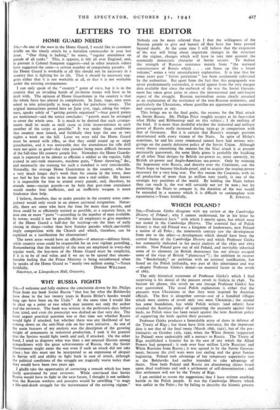WHY RUSSIA FIGHTS
Slit,—I welcome and fully endorse the conclusion drawn by Mr. Philips Price froin my book Soviet Russia " that but for what the Bolsheviks have done in the last twenty years in Russia Hitler's hordes would long ago have been on„, the Urals." At the same time I would like to clear up a point or two which may interest not only the author and the reviewer. The book was written in the prehistoric days before June 22nd, and even the postscript was drafted on that very day. The most urgent practical question was at that time not whether Russia would fight if attacked, but whether there was any likelihood of her coming down on the anti-Nazi side on her own initiative. As one of the main features of my analysis was the descripton of the growing weight of armaments in industrial production, I took it for granted that the Soviets would fight tooth and nail, if attacked. On the other hand, I tried to disprove what was then a not unusual illusion among sympathisers with the great achievements of Russia, that the Soviet Government might enter the war even if such an attack did not take place ; but this must not be interpreted as an expression of despair in Soviet will and ability to fight back in case of attack, although the political conditions of the struggle are tragically worse today than they would have been two years ago.
I gladly take the opportunity of correcting a remark which has been justly questioned by your reviewer. While convinced that Soviet Russia would have to fight in the near future, I thought it not unlikely that the Russian workers and peasants would be unwilling " to wage a life-and-death struggle for the maintenance of the existing regime." Nobody can be more relieved than I that the willingness of the Russian people to give and hazard all they have has been proved beyond doubt. At the same time I still believe that the exigencies of the war will bring about important changes in the structure of the regime, changes which will have to take into account the essentially democratic character of Soviet society. To deduce the strength of Russian resistance mainly from " the national consciousness of Russia which . . . can flame up like a latent volcano," seems a very unsatisfactory explanation. It is true that for some years past " Soviet patriotism " has been assiduously cultivated by the authorities. But apart from the fact that this propaganda was never predominantly nationalist, it would appear from the very meagre data available that since the outbreak of the war the Soviet Govern- ment has taken great pains to stress the international and anti-fascist aspect of the struggle. Russian nationalism seems clearly unsuited as an explanation of the resistance of the non-Russian minorities, and particularly the Ukrainians, whose guerillas are apparently as numerous and courageous as any.
This brings me to the final point, the reasons for the Nazi attack on Soviet Russia. Mr. Philips Price roughly accepts at its face-value what Hitler and Ribbentrop said on this subject ; I do nothing of the kind. It is more than doubtful whether the industrial and military power of Russia really increased during 1939-41 in comparison with that of Germany. But it is certain that Russia's strategic position deteriorated with every victory of the Nazis. In spite of Hitler's assertions, he and his army command cannot have had serious mis- givings on the purely defensive policy of the Soviet Union. Although every theory concerning the reasons for-the Nazi attack is at present necessarily guesswork, the most likely guess is probably the baulking of all other Nazi designs by British sea-power or, more correctly, by British air-power and Anglo-American sea-power. Only by winning the hegemony over Russia, and thereby over the Continent, can the Nazis hope to become blockade-proof, and to acquire the staying-power necessary for a very long war. For this reason the Caucasus, with its oil production of more than 3o million tons yearly, is one of the strategic key positions of the world. By holding the Nazis before they can reach it, the war will certainly not yet be won ; but by permitting the Nazis to conquer it, the duration of the war would be extended in a manner which it is difficult to contemplate with






















 Previous page
Previous page